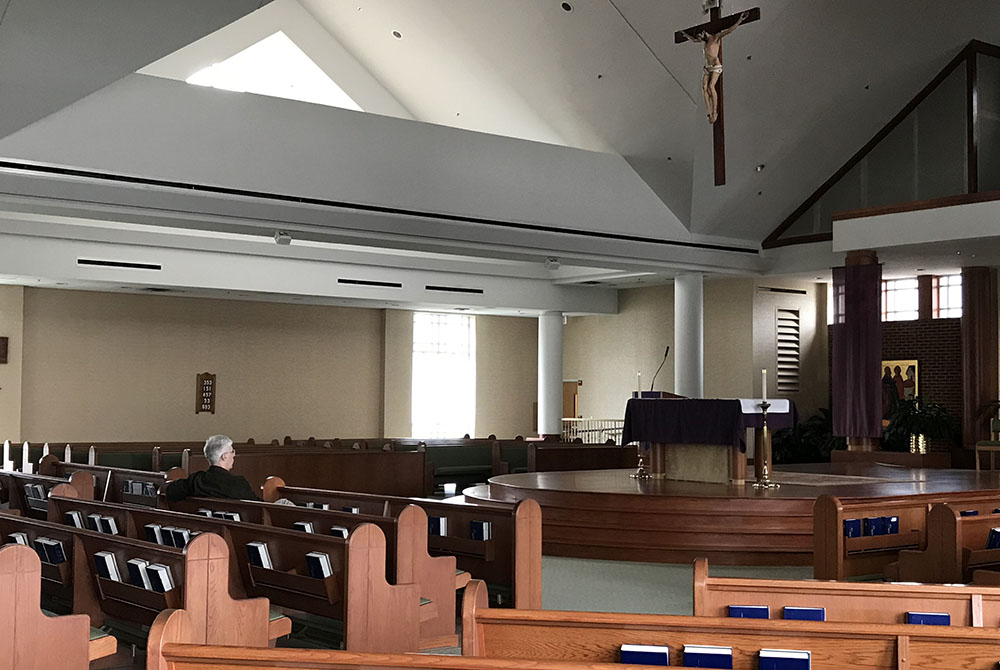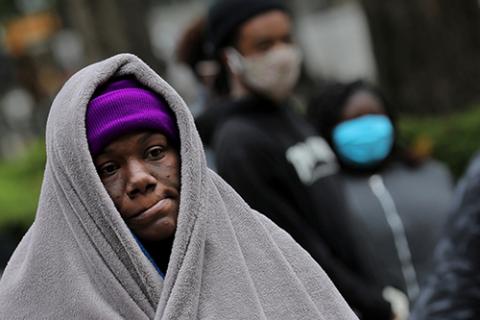
A man in Arlington, Virginia, sits by himself inside St. Ann Church March 20 during the coronavirus pandemic. (CNS/Arlington Herald/Ann M. Augherton)
As the human race joins the rest of the planet in a struggle for survival, the church is also trying to find its footing.
Why?
Clericalism.
For too long — say, 800 to 1,000 years — the sacramental life of the church has been under priestly lock and key. Around the 10th century, the custom of stipends for Masses arose. Suddenly, the spiritual value of men's prayers gained over the spiritual value of women's prayers and women's abbeys and monasteries failed one after another.
Coincidentally, the cursus honorum ("course of honor") ended the diaconate as a permanent vocation. Unless one was destined for priesthood, he could not be ordained as deacon. Very few men became "permanent" deacons and women deacons — even abbesses — were no longer ordained.
Which brings us back to clericalism, the attitude that grace is dispensed to the people of God only by a cleric, preferably a priest. Thousands of priests are not like that. But thousands are.
Pope Francis alluded to the problem in a recent homily. Eucharistic celebrations on television and radio, he said, create a "gnostic familiarity," but not community. Virtual celebrations provide some spiritual nourishment, but they are not "church." As Francis said, church means coming together to share the bread.
The deeper problem with electronic Eucharists is they reduce prayer to priestly performance. What is the difference between today and the 1950s, when the priest with his back to the congregation, mumbled on and on in Latin at "his Mass"?
What does participation in the Mass mean? Some folks have taken to bringing their own bread and wine to the TV room, or even performing do-it-yourself liturgies without a broadcasting priest. Are these intended to do as the church does? Does either create the communion of church?
Then, there are other sacraments to think about. Drive-by confessions are an interesting innovation, but sacramental anointing of the thousands of dying COVID-19 patients is practically impossible. Marriages can be contracted without a priest, but far be it from chanceries to let that canon out of the book.
Here we go, one by one.
Confession. Recently, the pope pointed out that reconciliation can be postponed until the proper form is possible. Despite historical documentation of confessing to laymen (notably on the battlefield), to abbesses and deacon-abbesses (within their territories), and to deacons, the canons of the 16th-century Council of Trent reserved sacramental reconciliation to priests granted juridical faculties from their bishops, and that has not changed.
Anointing. The sacrament of the sick, once occasionally administered by laypersons and often by women deacons (to other women), is now restricted to priests. Confession occurs (if requested) prior to anointing, but only a priest, sometimes using an "instrument" to apply the oils, can anoint. Why can Canon 1000.2 not include a nurse or doctor as an "instrument"? The bishop of Springfield, Massachusetts, thought so, but the Curia quickly slammed that window down.
Marriage. Canon 1116 stipulates that if a proper minister (read: cleric) is not available in the foreseeable future, then two witnesses and the couple's consent create a valid marriage. Bishops in mission territories often grant faculties for witnessing marriage, and for solemnly baptizing, to lay ecclesial ministers (recall, 60% of Amazon parishes are managed by women), but the legal process can be cumbersome. Could the pandemic remind the church that couples administer this sacrament to each other?

A homeless woman in Birmingham, Alabama, waits in line as food and clothes are distributed April 18. (CNS/Reuters/Carlos Barria)
So where is "church" in all this?
We are clearly all in this together and we hunger for grace. We need community, we need blessing, we need charity.
Community is where we find it. No longer the Friday fish fry, it is the Thursday afternoon Zoom with college friends. It is folks on the supermarket line. It is the garbage collectors honking and waving.
Blessings come extra-ecclesial. They come from the school crossing guard, now directing traffic at the testing-site, who says, "God bless you, honey, good luck." They come when the landlord forgives a month's rent. They come when the market owner slips a pound cake in the bag, on the house.
And charity is all around us. Yes, we learn about it on television and Facebook, but who cannot appreciate the nurse traveling hundreds of miles to give another nurse a break? What about the restaurant owner who packs lunches for the homeless? Try counting the soup kitchens and food banks that work, day after day after day because it is the Christian, or Jewish, or Muslim thing to do.
The pope is correct. Electronic liturgies do not bring us spiritually together. We are still detached, together but not together. The community, he said, is a sacrament. It is the community that brings intimacy with Christ, that brings intimacy with the holy faithful people of God. It is community we need.
Difficult as it is, I rather think we are getting there.
[Phyllis Zagano is senior research associate-in-residence at Hofstra University in Hempstead, New York. She will speak Oct. 3 at the Voice of the Faithful Conference "Visions of a Just Church" in Newton, Massachusetts, and Oct. 4 at St. Ignatius Church, Chestnut Hill, Massachusetts. Her books include Women Deacons: Past, Present, Future (in Spanish as Mujeres Diaconos: Pasado, Presente, Futuro), published in France and Canada as Des femmes diacres and in Portugal as Mulheres diáconos: Passado, presente, futuro. Study Guides are available for free download at https://sites.hofstra.edu/phyllis-zagano/. Her most recent book is Women: Icons of Christ.]
Editor's note: We can send you an email alert every time Phyllis Zagano's column, Just Catholic, is posted. Click here to sign up for email alerts.
Advertisement







